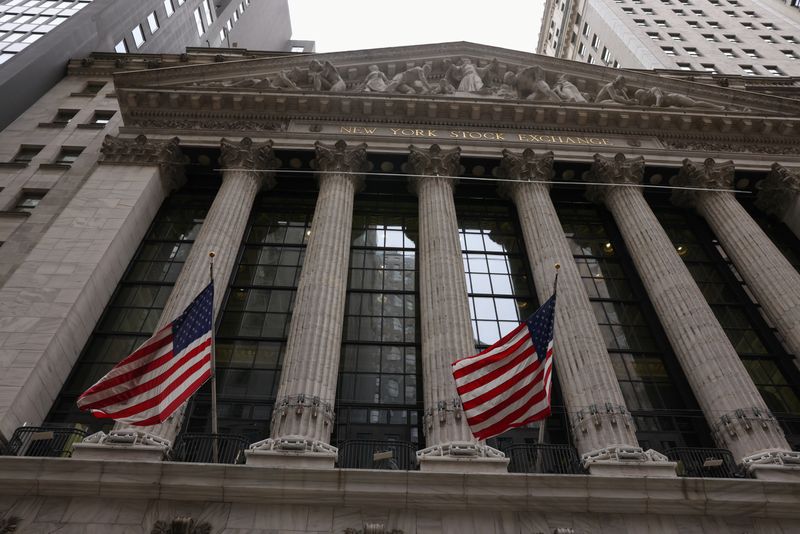By Carolina Mandl, Nell Mackenzie and Summer Zhen
NEW YORK/LONDON/HONG KONG (Reuters) - Having weathered a dire 2022, many global hedge fund managers are preparing this year for persistent inflation and seeking exposure to commodities and bonds that perform well in such an environment.
A majority of the 10 global asset and hedge fund managers surveyed by Reuters said commodities are undervalued and should thrive as global inflation stays elevated in 2023.
Their other top picks included inflation-linked bonds to shield against price rises and selective exposure to corporate credit, as higher interest rates restore some differentiation in company bond spreads.
High on their list of assets to avoid or short-sell are equities: stock markets were whipsawed by the sudden tightening in monetary conditions last year and many companies could see their earnings eroded further in 2023.
"Equity markets seem to be pricing in what I would call the impossible trinity ... that we're going to have lower rates, we're going to have disinflation and earnings are going to remain resilient," Jordan Brooks, co-head of macro strategy at the $143 billion AQR Capital Management, told a conference last month.
Brooks said that scenario is too optimistic and he recommended a risk-parity investment approach that gives weighting to the riskiness of assets, across stocks, bonds and commodities.
Investment data firm Preqin estimates hedge fund returns were negative 6.5% in 2022, the biggest fall since a decline of 13% in 2008 during the global financial crisis. Preqin said just 915 hedge funds were launched in 2022, the lowest in 10 years.
London-based hedge fund manager, Crispin Odey, who profited last year from short positions on British government bonds, is betting inflation will remain high. Odey's OEI MAC fund ended 2022 up about 145% for the year and, though he has reduced his short position in gilts, he has remained long inflation-linked gilts.
"Commodities will start to rise again. They've sold off very heavily and are below operating costs in many instances," Odey told Reuters.
"But owning sterling – if that breaks, that will be a very serious break. I don’t know when that will come, but it may.”
Most of the hedge fund managers Reuters spoke to think long-short equity strategies will remain out of favour after last year's underperformance, while macro-driven strategies that exploit volatility and can be long or short any asset will extend a strong run.
"We're bullish on strategies that take advantage of volatility," Joe Dowling, global head of Blackstone (NYSE:BX) Alternative Asset Management, which oversees roughly $80 billion invested in hedge funds. "It's the perfect environment for macro hedge funds: central bank policy divergence, interest rate differentials, geopolitical tension, bottlenecks and each country on its own. It presents a ton of opportunities."
Macro hedge funds led the industry performance through November, according to financial data firm HFR, up roughly 8%.
Kevin Lyons, senior investment manager at abrdn's hedge fund solutions, which has $14 billion allocated to external hedge funds, expects a mild global recession in the year ahead.
Lyons is keen to allot more to macro hedge funds and also thinks there are good opportunities in corporate credit.
"If you can find a good company with a good balance sheet, chances are they're trading at a wider spread than what they were three years ago. And you're getting paid to sit through what could be some volatility right now in markets," Lyons told Reuters.
Danielle Pizzo, chief strategy officer at Schonfeld Strategic Advisors, which manages allocation to multiple strategies, also aims to focus more on investment grade and high-yield bonds this year as well as commodities.
Making the bearish case for such credit is Boaz Weinstein of the $4.8 billion Saba Capital Management, which has been short European corporate credit all year.
"There is a high risk that something in the market will break.... whether it breaks because of inflation or because some sector creates a wider spread of defaults," said Weinstein. "Our base case is that credit risk is going to be challenged next year."
STAY OUT OF STOCKS
Andrew Swan, head of Asia ex-Japan equities at Man GLG, a part of British alternative investment manager Man Group, is apprehensive of companies in Asia that are exposed to developed markets, where he expects inflation problems and slower growth.
"We are negative on Taiwan generally, which is more exposed to global growth," Swan said.
Most hedge funds that Reuters spoke to are bearish on equities, particularly if the Federal Reserve keeps raising rates to fight inflation.
Kenneth Tropin, the founder and chairman of the $19 billion U.S.-based Graham Capital Management, noted that Fed funds futures are priced for U.S. rates to peak at 5% in 2023 and drop to 3.5% by mid-2024, which implies the market expects inflation to cool considerably over the course of the year.
Tropin believes this is too optimistic: while it takes longer for inflation to calm, the economy will slow. "I am not convinced that equity prices truly reflect this erosion in earnings. I think stocks look expensive," he said.
As was the case in 2022, the correlation between individual stocks is likely to be high this year, making it challenging to execute long-short strategies, some of the fund managers said.
While stocks fell last year, their moves were controlled and slow, crushing volatility trades too.

Raanan Agus, global co-head and co-chief investment officer of Goldman Sachs (NYSE:GS) Asset Management's Alternative Investments & Manager Selection, which manages a fund of hedge funds with roughly 100 managers, told Reuters they are: "focused on hedge funds that are non-market or lesser market correlated."
(This story has been corrected to fix the Saba assets under management figure in paragraph 18)